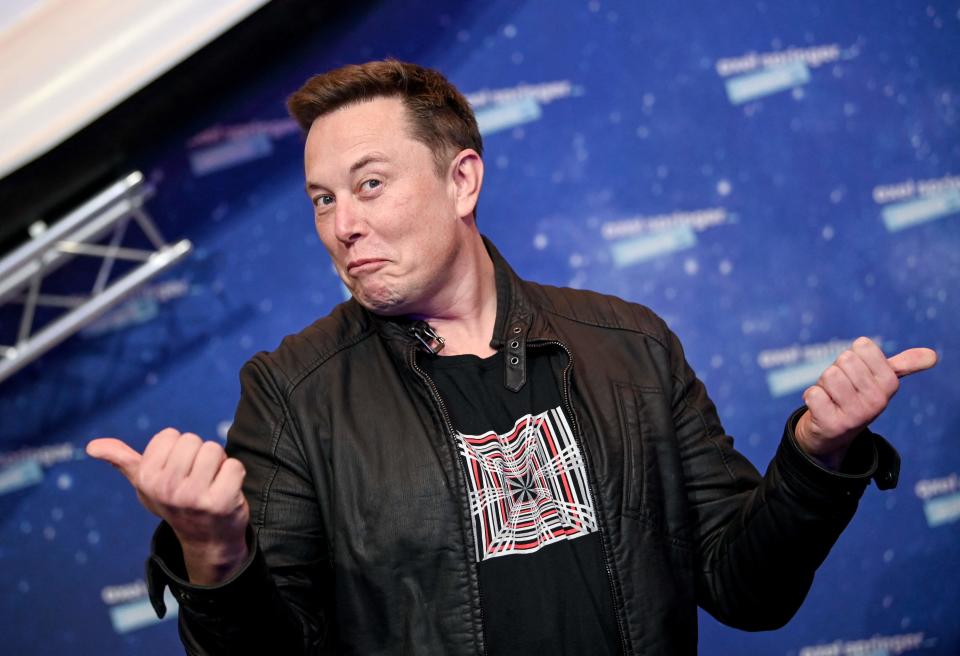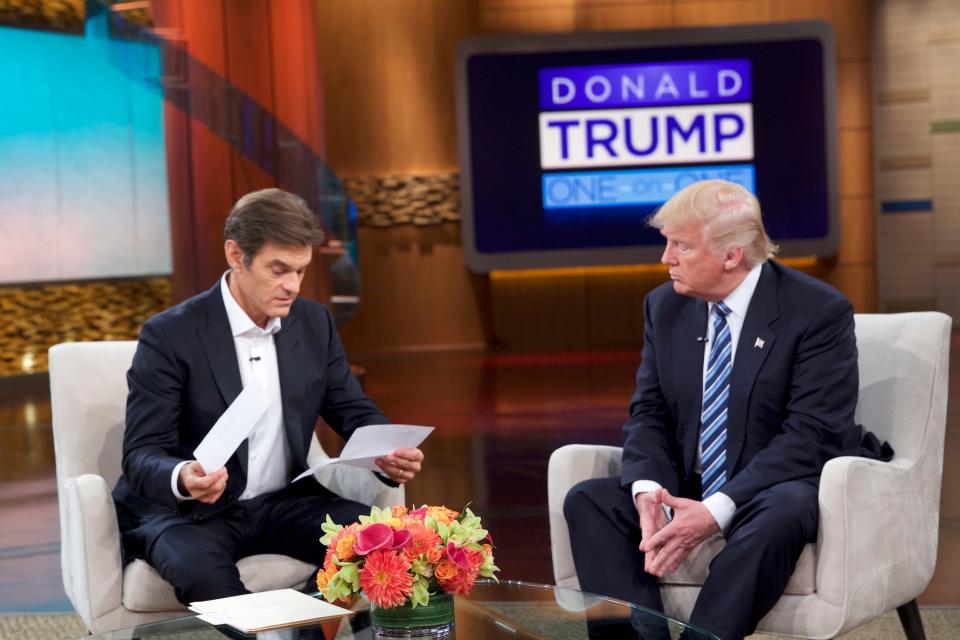Elon Musk is no doctor, but he plays one on Twitter. Doesn't he realize that's dangerous?
- Oops!Something went wrong.Please try again later.
I think I may have COVID. Or is it flu, or maybe allergies, or strep throat or maybe a cold? What should I be taking? Should I quarantine just in case, or carry on, maybe with a mask? Wait, what do you mean you're not a doctor? Why are you telling me what to do?
Sorry, I don't really have anything except a new reason to dread Elon Musk's takeover of Twitter: He's dispensing medical advice based on stuff he hears from people he knows. He says he wants to make Twitter "maximum fun," but the oblivious Dr. Musk could end up causing harm that's real and even deadly.
The moment that drove this home to me was when Marc Andreessen, a tech billionaire with 1 million followers, posted musings Friday about his experiences with Adderall (prescribed for attention deficit hyperactivity disorder) and Wellbutrin (an anti-depressant). Replied Dr. Musk: "Wellbutrin is way worse than Adderall imo. It should be taken off the market. Every time that drug has come up in conversation, someone at the table has a suicide or near suicide story."
Opinions in your inbox: Get a digest of our takes on current events every day
A person with no training or expertise giving a medical opinion is bad enough. Add to the mix Musk's more than 90 million followers (yes, you read that right), and it's a catastrophe in the making. Haven't we already gone through this with ivermectin, sunlight and bleach injections to cure COVID-19? But instead of learning from the mistakes of Dr. Donald Trump, medical genius, Musk is in contention for the title of misinformer in chief.
Don't go to Musk for medical advice
Worries about the Tesla CEO and SpaceX owner have mostly centered on what exactly he would allow to be said on Twitter in the name of free speech – and how seriously he would take his new role if the deal went through and he truly became Twitter's owner. I'm now worried that he wouldn't understand that role at all.
Rep. Alexandria Ocasio-Cortez (D-N.Y., 12.9 million followers) expressed her concerns recently in a pointed tweet: "Tired of having to collectively stress about what explosion of hate crimes is happening bc some billionaire with an ego problem unilaterally controls a massive communication platform and skews it because Tucker Carlson or Peter Thiel took him to dinner and made him feel special."
Musk's response: "Stop hitting on me, I'm really shy."
Columnist Suzette Hackney: Elon Musk could help change the fabric of American society. Instead he bought Twitter.
Suffice it to say that did not address the question of what, if anything, he intends to do about hate speech on the platform. Or whether he will be less dismissive and more accurate in his own tweets.
The thing is, people listen to Musk. For instance, Musk tweets were rocket fuel for exploding interest in the malaria drug hydroxychloroquine as a treatment for COVID-19, including Trump’s. The study Musk tweeted was badly flawed and eventually even Trump stopped pushing people to take the drug.

And following Musk's Wellbutrin tweet last week, Pranay Pathole – an IT professional with over 143,000 followers who became Musk’s Twitter “friend” after solving a tech problem for him – asked him: "What do u think about Ritalin? Is that a good replacement for Adderall& Wellbutrin? Ritalin works sooner and reaches peak performance more quickly than Adderall does."
My young patient struggled with depression: And TikTok was making it worse.
Instead of saying "talk to your doctor," Dr. Musk offered his medical opinion: "I have not heard bad things about Ritalin, which is not good to say it’s good, just haven’t heard bad things about it." And followed up with another anecdote: "A friend just emailed me about her bad Ritalin experience. Best to be cautious with all neurotransmitter drugs."
Doctors were punchlines in Trump era
The Trump era featured spurious, sometimes comical medicine, even from real doctors. Dr. Harold Bornstein kicked it off in a December 2015 summary of Trump's health. “His physical strength and stamina are extraordinary,” Bornstein wrote. “If elected, Mr. Trump, I can state unequivocally, will be the healthiest individual ever elected to the presidency.” (Spoiler: Bornstein told CNN in 2018 that Trump had dictated the letter.)
White House Dr. Ronny Jackson was equally effusive about Trump’s health in a 2018 news conference – his “incredibly good genes,” his “excellent” overall and cardiac health, his “exceedingly” good performance on a cognitive test, his potential to live to be 200, or at least through two terms, if he ate better.
Columnist Rex Huppke: Marjorie Taylor Greene's Bible must be a lot different from my version filled with compassion

Trump later hired Dr. Scott Atlas, a magnetic resonance imaging specialist with no expertise on infectious disease, to advise him on the coronavirus; the results were not optimal. In this year's Pennsylvania GOP Senate primary, Trump endorsed celebrity TV heart surgeon Mehmet Oz, who has promoted unscientific, sometimes false and potentially dangerous information about treatments for COVID and other conditions.
More from Jill Lawrence:
►Why I'm still on Facebook, even though it's dividing and inciting America for profit
►Zelenskyy's path from comedy to tragedy: Can he save Ukraine from Russian war invaders?
Musk, who despite his tweet to AOC is never shy, has been opining on COVID since the pandemic began. He has opposed vaccine and stay-at-home mandates, and his brash takes often have been wrong.
“The coronavirus panic is dumb,” he tweeted on March 6, 2020, of the virus that has now killed nearly 1 million Americans.
He predicted soon after that “the panic will cause more harm than the virus.” He called lockdown restrictions “fascist” and said he was outraged by the “forcible imprisoning of people in their homes.”
He also said he would refuse any future COVID vaccine (a position he later reversed).
Facts should trump fun on Twitter
Like Musk, I am not shy about sharing my opinions. But whether you agree or disagree, they are based on reporting and research, and argued on the facts. I would never tell my modest 26,250 Twitter followers to take or not take a certain drug – say, Wellbutrin – based on what I heard from a friend or relative.
But I might cite research. And as it happens, authoritative National Institutes of Health studies show that bupropion, the generic marketed as Wellbutrin and other brand names, is safe, effective and well-tolerated.
Mr. Musk, you are not a doctor, and tarring meds that may be keeping people alive is not "maximum fun." You can still choose your Twitter adventure. I hope it ends well, for you and for us.
Jill Lawrence is a columnist for USA TODAY and author of "The Art of the Political Deal: How Congress Beat the Odds and Broke Through Gridlock." Follow her on Twitter: @JillDLawrence
You can read diverse opinions from our Board of Contributors and other writers on the Opinion front page, on Twitter @usatodayopinion and in our daily Opinion newsletter. To respond to a column, submit a comment to letters@usatoday.com.
This article originally appeared on USA TODAY: Elon Musk plays Twitter doctor on ADD, depression. Don't listen to him

